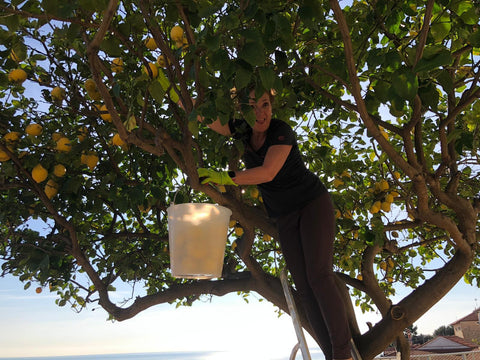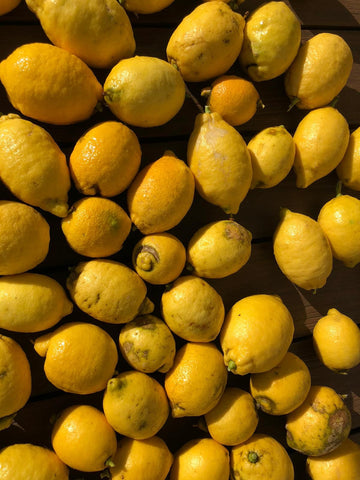The Family Lemon Tree: A Heritage of Flavors and Tradition
In the heart of the enchanting atmosphere of Sanremo, a picturesque town on the Italian Riviera, stands a true botanical gem: the Tomasi family's lemon tree. Planted nearly 35 years ago in the garden of their apartment, this majestic tree embodies the soul and passion of this Italian family for nature, cooking, and traditions rooted in the fertile soil of Italy.
Since it was planted, this lemon tree has been the faithful guardian of magnificent lemons, fruits of its inexhaustible generosity. Untreated, they have benefited from the love and devoted care of the Tomasi family, thus becoming the beating heart of their home. Each lemon harvested is much more than a simple fruit; it is the symbol of a story, a tradition, and a heritage passed down from generation to generation.
These precious lemons have been used with respect and ingenuity by the Tomasi family. From traditional Italian cuisine to the boldest culinary creations, they have brought their brightness and freshness to every dish prepared with love. They have also been essential ingredients for making refreshing lemonades, perfect for hot summer days, and for experimenting with the famous family limoncello, later renamed "Limonceflo" in tribute to its source.
Despite the passing years, the Tomasi lemon tree remains an imposing and dazzling figure in their garden. Its lush foliage and majestic silhouette are a living testament to the love and care given by the family through the seasons. Twice a year, in spring and autumn, it adorns itself with its finest fruits, offering an abundant harvest that warms hearts and reminds everyone of the importance of cherishing nature's treasures.
This tree, lovingly tended by the Tomasi family, is much more than just a part of the landscape. It is the guardian of a centuries-old tradition, the silent witness of shared moments and precious memories. For the Tomasi family, every lemon picked is a celebration of love for Limonceflo and the precious heritage that connects them to their land and Italian roots.

The Careful Nurturing of a Lemon Tree: An Art to Master
Taking care of a lemon tree like the one cherished by the Tomasi family is a subtle art that requires attention, patience, and know-how. Here are some essential tips for successfully maintaining this fruit tree:
-
Choosing the right location: The lemon tree thrives under generous sunlight. Make sure to plant the tree in a well-exposed sunny spot, preferably sheltered from strong winds and drafts.
-
Regular watering: Lemon trees need regular watering to keep the soil cool and moist. During periods of active growth, water the tree regularly, ensuring the soil is neither waterlogged nor dry.
-
Balanced fertilization: To promote healthy growth and abundant fruit production, fertilize the lemon tree with a balanced fertilizer specially formulated for citrus. Apply the fertilizer in spring and summer, according to the manufacturer's recommendations.
-
Careful pruning: Regular pruning of the lemon tree is essential to maintain its shape and health. Remove dead, diseased, or damaged branches, as well as those growing inward toward the tree. Also prune to promote air circulation and light penetration in the canopy.
-
Disease and pest monitoring: Carefully monitor the lemon tree for any signs of disease or pest infestation. Treat problems as soon as they appear using biological control methods or products approved for citrus.
By following these care tips, you can grow a thriving and productive lemon tree that will continue to provide you with an abundant harvest of untreated lemons, like the one that has been the pride of the Tomasi family for decades.

The Difference Between Organic and Untreated Lemon Trees
In the field of agriculture and citrus cultivation, it is important to distinguish between an organic lemon tree and an untreated lemon tree. Although these terms may seem similar, they actually imply distinct cultivation practices that have a significant impact on the health of the tree, the quality of the fruit, and the environment.
An organic lemon tree is grown according to certified organic agricultural practices, which means that no synthetic chemical pesticides, chemical fertilizers, or genetically modified organisms are used in its cultivation. Instead, organic farmers use natural and sustainable methods to nourish the soil, control pests, and preserve biodiversity.
On the other hand, an untreated lemon tree may simply refer to a tree that has not been subjected to specific chemical treatments, such as the use of pesticides or chemical fertilizers. However, this does not necessarily guarantee that the tree is grown according to organic and environmentally friendly practices.
The main difference between an organic lemon tree and an untreated lemon tree lies in the cultivation methods and associated certification standards. While organic lemon trees are grown according to strict standards verified by third-party certification bodies, untreated lemon trees may be grown without any official certification, which can lead to variability in the agricultural practices used.
In conclusion, whether you choose an organic lemon tree or an untreated one, it is essential to select quality fruits and support farmers who practice environmentally friendly cultivation methods. By growing your own lemon tree, nurturing it with love, and ensuring its well-being, you can enjoy the freshness and incomparable flavor of lemons while contributing to preserving the planet's health for future generations.





